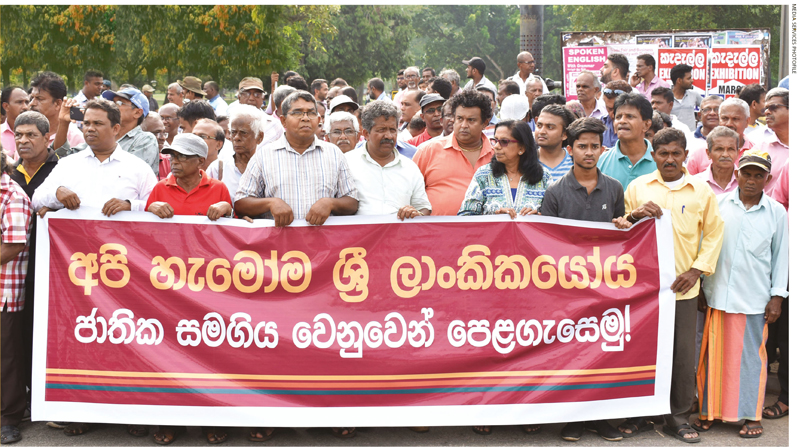POLITICAL RISK
MITIGATE POLITICAL RISK AND PROPEL INVESTOR CONFIDENCE
BY Srinath Fernando
The recent unrest in some parts of Sri Lanka is having a devastating effect on the economy – but as the full story is still unfolding, its overall impact on the economy cannot be accurately determined as yet.
Meanwhile, the political uncertainly that unfolded soon after the local government elections also created a situation where the Sri Lankan Rupee plunged to a record low against the US Dollar.
Of course, the true impact of political uncertainty can only be assessed by the Central Bank of Sri Lanka. Political risk is an important yardstick that government policy must take cognisance of. If this risk isn’t taken into account, it could tend to hurt the economy.
Indeed, political risk manifests in many forms. Political uncertainty, instability, indecisiveness and vacillation in making the right decisions, an absence of the rule of law, perceived threats to minorities and environmental hazards are the major setbacks that would have a direct bearing on political risk indicators.
Foreign governments are keeping a close tab on political risk, as it can have a direct bearing on foreign direct investment (FDI). As far as FDI is concerned, political risk refers to the likely disruption of business operations by political forces and events occurring in host countries – by accident or design, or as a result of changes in the international environment.
Some policy measures are implemented to impact foreign companies so that they would be forced to withdraw their investments. Such steps have been taken in countries with authoritarian tendencies where multinational companies have been penalised for having been partial towards a certain political party or ideology, or engaging in domestic political games.
In some countries, political risk is largely determined by uncertainty over the actions not only of governments and political institutions, but also minority groups and separatist movements, which play an important role in domestic politics.
Major political risk factors include restrictions on the transfer and convertibility of profits arising from investments in the host country.
Expropriation has been a major factor in political risk; it has been identified as a penalising measure by host countries for political reasons. However, expropriation is now controlled by international conventions and norms so its occurrence has in effect been curtailed over the years.
This is because it results in a loss of investments as a result of discriminatory and arbitrary acts by a branch of the government that may reduce or eliminate ownership, control or the rights to an investment either as a result of a single policy decision or through subtle means over a period of time.
In some cases, the host government’s breach or repudiation of a contractual agreement with the investor (this includes not honouring arbitral awards) could cause grave concern among other investors – they would be alarmed by how they’d be treated in similar circumstances.
The recent violence in Sri Lanka erupted mainly through hate speech and incitement to violence. The thought that one group with extremist views could impose a boycott on doing business with another ethnic group with different religious affiliations has sent ripples through the business community – this is a political risk that results in losses due to politically motivated acts of violence by non-state actors.
It has been nine years since the 26 year war was brought to an end. However, the peace dividend has not yet been fully realised.
The recent violent attacks on minorities would impinge on the government’s sincere efforts to bring about a political solution through a constituent assembly created for this purpose with overwhelming support. But the government seems to be struggling in its efforts to instigate constitutional reform due to other distractions that impact its electoral performance.
There is an urgent need to pursue reconciliation and establish a healing process among various ethnic groups. Civil society must be engaged in pursuing peace and reconciliation. And advocacy mechanisms must be reignited to raise awareness among the majority. Coexistence must also be taught at school level and a serious programme should be initiated to engage the citizenry.
If citizens are properly engaged in reconciliation, perhaps it can work for the betterment of society.
Since the government is actively encouraging FDIs, it must introduce measures to improve investor confidence. The ground realities must be in keeping with the impressive political promises – for instance, the rule of law should be at the top of the agenda and it must be reestablished forthwith.
When making decisions, there must be coherent policies in place that should not be subsequently criticised by members of the same government. Ministers of the government must be bound by cabinet responsibility and everyone must speak in one voice. They cannot have a personal view on the one hand and an official view on the other.
A minister is part of the government 24/7 and cannot have personal views in the morning, a different view in the evening and yet another in their dreams!






The only time Sri Lanka ran smoothly with the president and prime minister from two different political parties was with Sri Lankabhimanya Dingiri Banda Wijetunga and Chandrika Bandaranaike Kumaratunga. This unity government should have disbanded after two years or they should never have taken people who were rejected by the people and given them ministries in the first place.
The JVP though, an obsolete bunch of people with outdated ideas, are the biggest funding agents and participators in these demonstrations. They obviously have a lot of funding. All these trade unions – if they make it mandatory to take a secret ballot before striking, I have a feeling there will be very few protests. Some of our few educated politicians have messed up more than others.
Having said that, education at least gives some discipline hopefully, and using the slots given to the national list on truly valuable individuals may help keep away the jokers who come out and criticise their own cabinets.
I wonder where the Janatha Vimukthi Peramuna’s (JVP) finances come from? Are big businesses the answer?
If the foundation is weak, then it may not be possible to put up a strong roof. All of the governments that have been in power since gaining independence in 1948 have been searching for plans, roles and models from other countries.
It could be appreciated if Sri Lanka had been able to learn from the success stories of other countries and their much smoother and effective transformations. However, here in Sri Lanka, it seems like everything is rocket science. Administrators cannot talk about developing a country when they know that they are using up the wealth of resources.
Without improving our local industries and depending on imports for even the most trivial of products, in which governments should rightly intervene, how can we brag about foreign direct investments? Given the inefficiency in many sectors especially with the bribery system entertained by government authorities, the business confidence in Sri Lanka among foreign investors stands low.
Most of all, there is no common thread in terms of national and economic policies, and implementation. One regime talks of another and this trend continues.
Politicos, as representatives of the public, usually talk about what should be done technically. But practically, what happens is the contrary.
Without capability, commitment and honesty, how can they walk the talk, and where will that lead? All discussions always lead us back to square one.
I’m humoured by the comment about rocket science. How true!